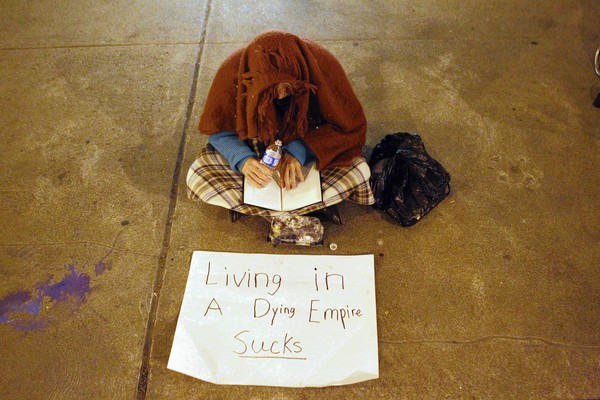
Nuccio DiNuzzo found Occupy Chicago protestor Christopher Spicer at LaSalle and Jackson. The Occupy movement has been a departure from protests both recent (Wisconsin) and distant ('68): a passive resistance to ideology. When the media asked "what do you want?" their answer was a panopoly of voices asking for everything but nothing in particular, forcing us to ask: what do we want? Marco Roth, in n+1, picked up on an interesting aspect to Occupy and the 99% self-designation:
Having looked at “We are the 99%” for pages and pages, I was suddenly overcome with an odd desire to see those iconic Walker Evans photographs of the Depression-era South in Let Us Now Praise Famous Men…. Part of a WPA project that aimed to call attention to the depth of rural American poverty, Evans’s photographs perversely ended up memorializing and ennobling the hardness of the lives that the government he worked for wanted to ameliorate. Through the very stoicism that came out on camera and James Agee’s accompanying text, his subjects came to signify the virtuous poor who deserved “a hand up, not a handout,” although they mostly got food stamps.
Those images were made to convince a public of outsiders, and that is the very thing that makes the suffering they display so easy on the eye, all these generations later. I wanted some old-time stoicism that I could project my emotions on, like the good liberal I stubbornly remain, even though I know that, in politics, no silence goes unpunished. What I wanted from OWS, too, as an outsider, was greater dignity, even while knowing that they wouldn’t be so indignant if America hadn’t lost all its own long ago.
The Occupy movement, among the many hard-to-define things it's tried to do, has made the point that the vast majority of Americans, the "99 Percent," despite being by definition the inside, are outsiders. Doing so has meant sacrificing stoicism, which is tantamount to dignity: admitting to financial struggles, confessing to poor health or life choices, above all showing fear and weakness. It's a movement of things people don't want to admit, based on things people don't feel they can talk about, a difficult and fascinating protest.
Photograph: Chicago Tribune


